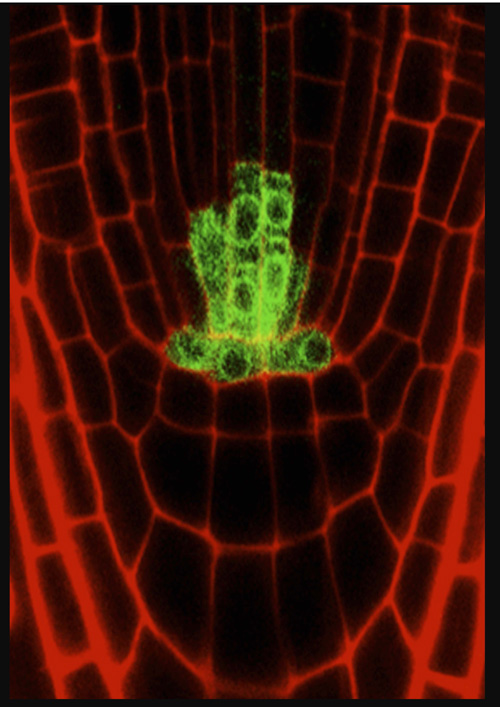The research shows that a protein called BRAVO in stem cells blocks the cell division mediated by hormones. Enables understanding the control of stem-cells activity mediated by hormones, which is common in animals and plants. This mechanism can help to develop plants stronger to adverse conditions
A new research led by Ana Caño-Delgado, CSIC scientists at the Centre de Recerca en Agrigenómica (CRAG), has found a molecule which blocks the stem cell division mediated by plant steroid hormones (brassinosteroids) in Arabidopsis. The protein is a transcription factor called BRAVO (acronym of Brassinosteroids at Vascular and Organizing Centre).
According to scientists, BRAVO is found only in the stem cell niche of the root (on the video, in green), where represses the cell division triggered by hormones. It acts, scientists say, “as a safe-lock” which prevents the uncontrolled cell proliferation. The study is published in Developmental Cell.
“We think”, say the scientists in the work, “that BRAVO gives the stem-cells the capacity to overcome external stress factors”, which trigger an over-expression of plant steroids. On their turn, the plant steroids cause cell division. Without BRAVO, it would happen an uncontrolled proliferation of the cells, the plant would not grow properly and would lose its capacity of adaptation to environmental changes. That’s why this work can help to develop plants stronger to adverse conditions.
Something similar happens to animals when there is an uncontrolled cell proliferation, which results in tumors. Therefore, the finding can help to understand the cell division mediated by hormones, and in the research against hormone-dependent cancers.
This work is part of the doctoral studies of Josep Vilarrasa-Blasi, at the laboratory of Ana Caño-Delgado. Also, the team of Marta Ibañez, at the Barcelona University, has contributed with a computational modeling to predict the effect of BRAVO and BES1 (a plant hormone) interaction. The predictions of this modeling confirmed by experimental works at CRAG laboratories. The work has also counted on the contribution of the Duke University (EUA), Heidelberg University (Germany), the CNRS (France), and the Universitat Pompeu Fabra (Barcelona).
Division, not division: a subtle cellular balance
Plants have non differentiated cells, which give them the capacity to grow indefinitely. They are the so called meristems, embryonic tissues found at the growing tips of roots. They enable the plant to grow along all its life. Also, plants have a reservoir or stem cell niche in the primary root, which is the first thing produced from the seed.
Ana Caño-Delgado and her team showed, in previous works, that plant steroids regulate the progression of the cell cycle and the differentiation of the meristems of Arabidopsis (see links at the bottom). Also, they demonstrated that increasing the steroids expression causes an accelerated and massive cellular differentiation, which drives to stem cell exhaustion (and therefore plants don’t grow more).
 In natural conditions, plants have a balance between cell division and not-division in the stem cell niche. There is always a core of non-dividing stem cells (they are in the so called “quiescent state”) although they are surrounded by other cells which have received the steroid signal and are quickly growing and dividing. What makes the quiescent cells not to divide? This was an unanswered question that now can be explained by the BRAVO molecule.
In natural conditions, plants have a balance between cell division and not-division in the stem cell niche. There is always a core of non-dividing stem cells (they are in the so called “quiescent state”) although they are surrounded by other cells which have received the steroid signal and are quickly growing and dividing. What makes the quiescent cells not to divide? This was an unanswered question that now can be explained by the BRAVO molecule.
High resolution techniques
To identify BRAVO, the team has used very specific techniques with high resolution (flow cytometry with specific markers of stem cells) in order to identify the genes involved in the hormone response that exist in every single tissue. “These techniques”, says Ana Caño-Delgado, “allow us to identify which genes of the 28.000 genes of Arabidopsis are in which cells. This is new, because normally genes are studied in whole organs (leaf, root, branches…) and has made possible to identify BRAVO which is exclusively in the stem-cell niche”.
Working with modified plants, they have seen that the plants that don’t express BRAVO have a high rate of cellular division. On the contrary, plants with BRAVO over-expression, have not cell division either root growing.
Scientists have also demonstrated that BRAVO directly blocks the cellular growth mediated by hormones. Specifically, they have seen that BRAVO counteracts BES1, a hormone which acts as a switch to trigger and regulate the cell division in the stem cell niche”.
BRAVO ensures low rates of cell proliferation and gives the plant the capacity of adaptation to environmental changes. Understanding this type of mechanism is essential to have plants that overcome adverse situations.
Regulation of Plant Stem Cell Quiescence by a Brassinosteroid Signaling Module. Josep Vilarrasa-Blasi, Mary-Paz González-García, David Frigola, Norma Fàbregas, Konstantinos G. Alexiou, Nuria López-Bigas, Susana Rivas, Alain Jauneau, Jan U. Lohmann, Philip N. Benfey, Marta Ibañes, Ana I. Caño-Delgado. DOI: http://dx.doi.org/10.1016/j.devcel.2014.05.020
Links to news about related previous works (in Spanish)
Plant Cell 2013 http://www.dicat.csic.es/dicat/ca/2013/277-hallan-receptores-hormonales-especificos-de-las-celulas-madre-de-las-plantas
